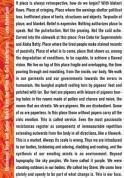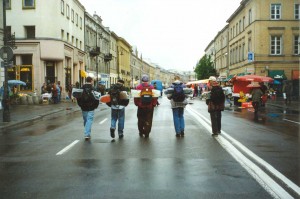 When I requested a review copy of Occasional Work and Seven Walks from the Office for Soft Architecture by Lisa Robertson, I was working as the managing editor of an architecture magazine while earning my MFA. The irony of my experience was how many architects used convoluted and turgid language to describe designs that were pared down to their purely minimal essences. The days I spent sorting through jargon like “fenestration” and “tectonics” were great training for nights spent finding the clearest way to communicate an idea in my own writing.
When I requested a review copy of Occasional Work and Seven Walks from the Office for Soft Architecture by Lisa Robertson, I was working as the managing editor of an architecture magazine while earning my MFA. The irony of my experience was how many architects used convoluted and turgid language to describe designs that were pared down to their purely minimal essences. The days I spent sorting through jargon like “fenestration” and “tectonics” were great training for nights spent finding the clearest way to communicate an idea in my own writing.
Essays on Art and Architecture
“We believe that the objective of architecture is to give happiness.”
A poet, Robertson uses her command of words to blend the architectural vernacular with everyday language. She writes in the persona of the Office for Soft Architecture which speaks in the first person plural about a wide range of issues that affect the urban environment from architectural style and color to invasive species.
One of the ways Robertson displays her skill with language is by pairing a simple sentence with a truly dense one:
“The Himalayan blackberry escaped. The plant’s swift rhetorical trajectory from aestheticized exotic, to naturalized species, to invasive alien, all the while concealing a spurious origin myth, displays a typically hackneyed horticultural anthropomorphism.”
At times, I found myself lost in the richness of her vocabulary, but the writing was so well crafted that I felt I still understood her meaning on some subliminal level. Just when I thought I might truly be done for, Robertson reeled me in by tying the lascivious undertones of strawberries in Jane Austen’s Emma to the Arts and Crafts Movement in British Columbia.
Some of my favorite essays in this book were commissioned to accompany art shows. I enjoyed leafing through the full-color illustrations of those shows and guessing what Robertson might have to say about them.
Seven Walks through a Changing City
“Imagine a very beautiful photograph whose emulsion is lifting and peeling from the paper. There is no longer a negative. To preserve it you must absorb this artifact through your skin, as if it were an antique cosmetic comprised of colloidal silver. You must absorb its insecurity.
The seven walks in this book are poetic journeys through a rapidly changing Vancouver. They are not meant as guidebooks. In fact, it would be impossible for an outsider to replicate the paths Robertson is describing. Instead, they impart the feeling of a city as it evolves around you. Sometimes she references architecture directly:
“Ruined factories rising into fog; their lapsed symmetries nearly gothic. The abandoned undulations of the vast mercantile storage facilities…”
Other times the walks become more emotional journeys.
“There was no window in the city that was not overtly moralistic – the roadways were illuminated and my decadence seemed to soak the asphalt so it shone.”
But the language is always evocative and it feels as though the setting is pregnant with potential stories even when Robertson is merely conveying a mood.
In Occasional Work and Seven Walks from the Office for Soft Architecture, Robertson finds poetry in the language of architecture and finds a new way to convey the experience of urban geography. It is a book architects will appreciate for the careful consideration of form and context and writers will appreciate for the plasticity of Robertson’s language.
If this review made you want to read the book, pick up a copy of Occasional Work and Seven Walks from the Office for Soft Architecture from Bookshop.org. Your purchase keeps indie booksellers in business and I receive a commission.
